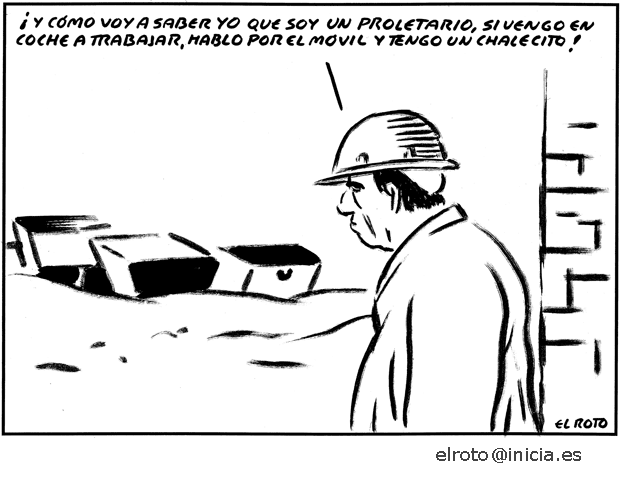{Última actualización: 18 Diciembre 2005}
¿Existe realmente algo que podamos llamar clase social? ¿Se trata de algo más que un constructo sociológico para describir nuestro entorno? La pregunta de marras lleva ya bastante tiempo con nosotros, y desde luego pocos dudarían en concebirla como directamente unida a la Sociología misma como disciplina de estudio. Cierto, fue Marx quien primero intentó aplicar el concepto al estudio científico de la sociedad moderna, pero se convirtió bien pronto en el elemento central de las disputas entre marxistas y weberianos. Max Weber había intentado interpretar la sociedad echando mano de su teoría de los tres componentes de la estratificación, que concebía a las clases sociales, de status y de partido como elementos claramente diferenciados. No obstante, el concepto weberiano de clase social era mucho más amplio que el empleado por Marx, pues en lugar de afirmar la propiedad de los medios de producción como el elemento distintivo esencial, Weber prefirió entenderlo de una forma mucho más flexible y amplia que incluía conceptos como status, prestigio social o estilo de vida. Pero todo esto consiste en un mero debate sobre el concepto de clase social como herramienta de investigación sociológica, subrayando la interpretación economicista de Marx o la más culturalista de Weber. Siempre y cuando limitemos el uso del concepto de clase a una mera herramienta de análisis, a un concepto del que podemos echar mano para agrupar individuos y describir procesos sociales, se trata de algo más o menos exento de polémica. En este sentido, la clase social no tiene por qué ser diferente de otros términos (género, status, colectividad, grupo social...) que forman parte del cajón de herramientas de cualquier sociólogo. Tendrá, sin lugar a dudas, sus limitaciones, pero no por ello deja de ser útil para entender el mundo que nos circunda. El conocimiento humano, después de todo, no tiene más remedio que recurrir a la simplificación de la realidad para así poder identificar características y elaborar leyes que nos puedan ser útiles durante nuestra vida cotidiana.
Marx, sin embargo, fue más allá de usar el concepto de clase social como una mera herramienta analítica, dotándola de una cierta pátina de mesianismo cuasi-religioso quizá relacionado directamente con su propio origen judío.
In the Middle Ages the citizens in each town were compelled to unite against the landed nobility to save their skins. The extension of trade, the establishment of communications, led the separate towns to get to know other towns, which had asserted the same interests in the struggle with the same antagonist. (...) The burghers had created the conditions insofar as they had torn themselves free from feudal ties, and were created by them insofar as as they were determined by antagonism to the feudal system which they found in existence. When the individual towns began to enter into associations, these common conditions developed into class conditions. The same conditions, the same contradiction, the same interests necessarily called forth on the whole similar customs everywhere. The bourgeoisie itself, with its conditions, develops only gradually, splits according to the divisions of labour into various fractions and finally absorbs all propertied classes it finds in existence (while it develops the majority of the earlier propertyless and a part of the hitherto propertied classes into a new class, the proletariat) in the measure to which all property found in existence is transformed into industrial or commercial capital. The separate individuals form a class only insofar as they have to carry on a common battle against another class; otherwise they are on hostile terms with each other as competitors. On the other hand, the class in its turn achieves an independent existence over against the individuals, so that the latter find their conditions of existence predestined, and hence have their position in life and their personal development assigned to them by their class, become subsumed under it. This is the same phenomenon as the subjection of the separate individuals to the division of labour and can only be removed by the abolition of private property and of labour itself. We have already indicated several times how this subsuming of individuals under the class brings with it their subjection to all kinds of ideas, etc.
(Karl Marx y Friedrich Engels: The German Ideology, International Publishers, Nueva York, EEUU, 1970, p. 82)
Concepto de conciencia de clase.
Sujeto histórico.
For still other purposes of analyses, e.g., legal or practical ends, it may be convenient and even unavoidable to treat social groups, such as the state, cooperative associations, business corporations, and foundations as if they were individual persons with rights and duties and as the executors of legally significant conduct. But for sociologically meaningful interpretations such organizations are merely the result of distinct behavior of individual persons, since they alone can engage as agents in any kind of meaningful behavior. Nevertheless, the sociologist for his purposes can hardly ignore such concepts of collectivity that derive from different vantage points.
(Max Weber: Basic Concepts in Sociology, Citadel Press Book, Nueva York, EEUU, 1993, p. 42)
Viñeta de El Roto publicada en El País:
- María Toledano: La ausencia del ser social en el capitalismo contemporáneo
- Chris Harman & Alex Callinicos: La clase trabajadora en el siglo XXI
